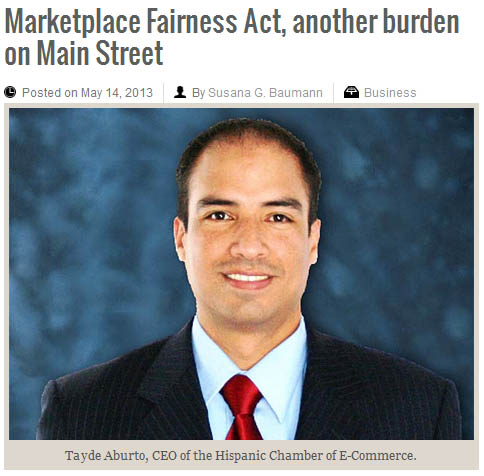Marketplace Fairness Act, another burden on Main Street
“Congress members have no knowledge of the challenges e-commerce small businesses face in a global competitive market,” Tayde Aburto, CEO of the Hispanic Chamber of E-Commerce told VOXXI.
An expert in electronic business, online marketing, market research, international business and projects focused on community growth and development, Aburto believes the legislation is an unfair treatment of e-businesses that are already burdened with extreme wide-open competition, service commissions and fees, shipping and delivery charges, and high cost of website software, credit card server safety, and online advertising.
“Many people believe that e-commerce is just launching a website and waiting for customers to click,” Aburto said.
In truth, any successful online business invests a good deal of money in marketing research, business planning, multiplatform online presence and additional licenses and server’s safety, the e-commerce expert assured.
Online stores have allowed consumers to compare prices and product information, find out additional information such as technical specifications, warranties –in black and white- and read other consumers’ reviews. Many online stores sell at very low margins and overhead, savings which in time are passed onto their customers.
No crazy lines, no out of stock or back orders, no unavailable or unwilling store clerks, easy shipping and return policies, and an eagerness to serve their customers, all from the comfort of their homes. Online businesses have worked hard at gaining the favor of online customers by launching a new hard to beat business model.
E-businesses complain the sales tax implementation will throw them out of business. This legislation might limit small e-commerce business competitive edge by forcing them to collect out-of-state taxes to be sent back to the consumer’s home states, a very complex implementation of tax collection that could cost thousands in tax collection software and the risk of out-of-state audits. “Instead, Congress should force local, state and federal governments to make their administrations more efficient and reduce the need of collecting additional taxes,” Aburto believes.
But the pool at stake is too big to ignore. Uncollected e-commerce sales taxes are believed to have reached over $11B in 2012, additional catalog phone and mail order sales would have soared the amount to $23B, a 2009 University of Tennessee study estimated.




